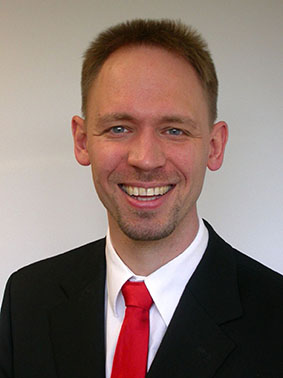

Successful through employees' inventions
Located in Swabian Metzingen in southwest Germany, REFUsol GmbH is one of the world's leading manufacturers of solar power inverters. The company was originally founded in 1965 as REFU Electronics for the prodcution of three-phase propulsion systems. In 1997, this innovative company entered the photovoltaic business and since then has produced multiple outstanding devices for converting direct currents from solar moduls into alternating currents for power grids. In April 2013, REFUsol was taken over by the American company Advanced Energy. Today, the company has been listed multiple times as one of the the top innovators among small and medium-sized enterprises in Germany. According to the company, the driving forces behind this success are active patent promotion and an atmosphere of innovation, which allows creative development to flourish. We spoke with Jochen Hantschel, head of technology development, and asked him about REFUsol's dealings with ideas and patents, the specifics of the company and about the products it manufactures.

GSC: Your research and development is, according to your website, the "heart of the company." New ideas emerge all the time at REFUsol, you write there. And with the number of patents you've registered, we don't doubt it. What is the path from an idea to a patent?
Jochen Hantschel: Usually patentable ideas emerge in the early phases of product development, for example system concepts or circuit arrays and certain methods regarding their use. Meanwhile, our employees are educated through a variety of training sessions not to treat their ideas as simply a normal occurrence in the course of their work, but rather to think about whether a scope of protection could be generated for the company by a certain approach to a topic. A simple and understandable invention disclosure form facilitates the registration with the patent department, and, if nothing else, each employee knows that he or she also has an appealing opportunity to earn some additional income through our attractively designed Employee Invention Rewards System. After the registration, the patent department decides together with the company management whether the suggested technical approach is beneficial for the company, and, if so, research on the latest technical developments in this area will follow. The outcome of this investigation is discussed with the inventor, and if the application looks promising, the process of applying for the actual patent is begun. The assistance of the inventor is once again actively sought out, in order to work with the patent attorney to optimize the technical scope of protection, to identify possible areas of exploitation by competitors in advance, and with that to protect and to choose the best way forward based on various strategic considerations.
GSC: You secure your innovations with patents. What importance does patent protection have for you with regards to your market position?
Jochen Hantschel: After the market for photovoltaic inverters was shaped by significant technical advancements during its emergent phase at the turn of the millennium, we are currently experiencing a consolidation phase in which it is essential to secure our market position as well as expand through technical innovation and, consequently, the establishment of scopes of protection. Businesses that neglect investing in innovation and the protection of its results are being overrun by the challenging market trend and/or they receive early competition from firms that try to accomplish their goals through hastily executed copying.
GSC: The patented UltraEta® Plus circuit topology is one of your innovative products. What is unique about this circuit?
Jochen Hantschel: The UltraEta Circuit Topology can be found in a number of our products. The guiding principle during the development was the bionic approach so that losses do not even occur when convertible energy needs to be transformed as minimally as possible. Since the voltage of a solar module fluctuates significantly over the course of the year, the energy of the generator is converted to a higher voltage by a state-of-the-art photovoltaic inverter, before being brought back into a sinusoidal grid. Through these two conversion levels emerge two separate conversion losses. The UltraEta® topology now boasts an additional direct semiconductor path from the solar module to the grid, through which the electricity from the solar module can be led directly to the network (as far as this is possible) via operational points, and only a small part of the entire output needs to be converted to a higher voltage level via the use of additives. Since the lion's share of the energy requires just one conversion process instead of the previously standard two, the overall losses from the inverter circuit are clearly significantly lower, as well as constant over a broad voltage and power range. We have created, so to say, the "direct injection" inverter.
GSC: What else distinguishes your products from competitors?
Jochen Hantschel: Our pv inverters are market leaders. Installers are particularly fond of products featuring power density, ease of use and compactness because, for example, one person can complete the installation of a 20 kilowatt inverter at a construction site, instead of the two people that were previously necessary. Our products consume fewer resources, a side effect that also benefits the environment.
We endeavor to always make timely technical innovations available for our customers or to develop new, innovative products, some covering fields of application that were previously unthinkable. This is highlighted in our SCI Inverter, which has 98.7 percent effectiveness and novel silicon carbide transistors. With this inverter we have brought the first everyday series device to market, featuring these high efficiency semiconductors. There is also our new product, the PV-Heater, with which we have created an entirely new product category. The utilization of pv electricity in the direct production of hot water was up until recently unthinkable, due to the perceived high cost. Yet these parameters have changed, and through this innovation we can now offer a simple, reliable and extremely economical alternative to water heating, with all of the positives of an integrated monitoring from the pv market.
GSC: Beyond Europe, you are also present in Japan and India. With your affiliation with the American company Advanced Energy, your presence expanded further. What considerations emerge as a result of this with respect to the patent protection of your products?
Jochen Hantschel: We began early to protect all of our important patents internationally as well as domestically; thus in our view, we don't expect any specific issues. Since Advanced Energy is also bringing their own scopes of protection, this represents a welcome addition to our claims which should lead to opportunities for synergy between the two companies.
GSC: Mr. Hantschel, thank you for this interesting interview.
More information: www.refusol.com
